

Mould problems are common in Consett. Our climate and houses are prime breeding grounds for mould. But mould isn't something that you have to live with and, in fact, mould removal should always be a priority due to the damage it can cause to both your property and your health.
At The Sparkle Gang, we have years of experience dealing with black mould and its associated issues and we have developed methods to remove mould that truly works. We can also help you to prevent mould from occurring again so that you can be free of the problem long term.
Get in touch today to find out how our mould services in Consett can help you.
A black mould outbreak looks unsightly and can be embarrassing, but that isn't where the problems end. Mould can cause a variety of serious issues that make dealing with it as soon as possible important.
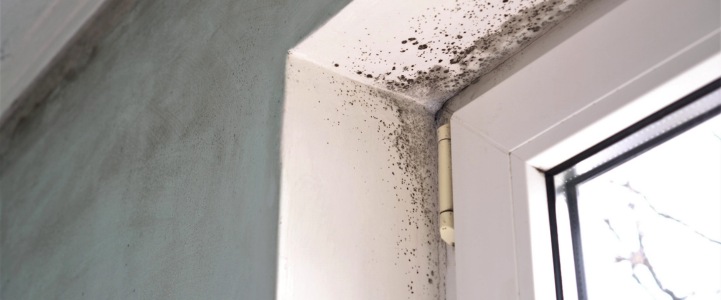
Surface mould can cause damage to your walls, ceilings, wallpaper, painted surfaces, furniture, soft furnishings, clothes, and even your soft toys. Anyone who has health with a serious mould problem will be able to tell you stories about just how much of their property got damaged.
The sooner you tackle black mould, the less likely it is to cause damage to your property.
Black mould can also cause serious problems for your health due to its impact on air quality. Breathing in mould spores can be hazardous. This isn't always too much of an issue for fit and healthy people but mould can get serious quite quickly for the vulnerable, including:
Because of the seriousness of the health issues that it can cause, it is important to get rid of mould as soon as possible.
While many people in Consett might consider these issues as less serious if you are living with a mould problem, the smell, sight, and experience of doing so can get unpleasant very quickly. Being too embarrassed for visits, worried that your clothes smell, and not being able to relax properly in your home can all cause stress.
We can help you to treat mould in your home so that you can relax and live more comfortably again.













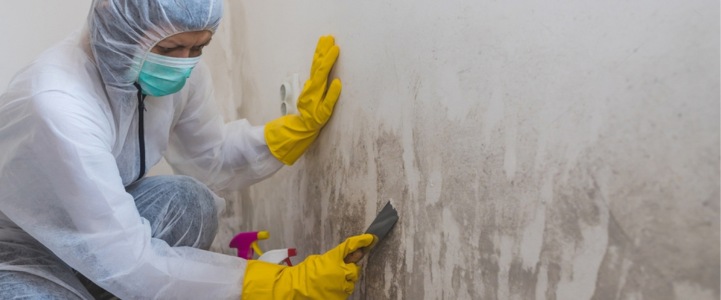
Mould spores are always present in every home, but you usually can't see them. Under normal conditions, they float around in the air and settle on surfaces before being removed by normal cleaning methods.
Mould becomes a problem when the spores are able to breed, and this is always caused by excess moisture. Moisture creates the breeding ground that the spores need to multiply and they can do so surprisingly quickly so that before you know it, you are dealing with a large mould patch.
You can think of moisture causes as fitting into two camps: behavioural and structural. Structural causes of excess moisture are due to water ingress. This can be due to cracks in your walls or pipes that allow water or rain to enter your home. You might notice damp walls or damp stains that indicate rising dampness.
Behavioural causes are usually related to behaviours that create excess moisture within the home. A classic example of this is drying clothes indoors without proper ventilation. When you think about it, the moisture from the clothes has to go somewhere and if it can't get outside through ventilation then it is going to settle inside the home.
The settling of this moisture is known as condensation. Condensation, especially on porous surfaces, is the perfect breeding ground for mould. And methods to reduce condensation can help to prevent black mould growth.
Of course, structural and behavioural mould causes do interact. If a home has poor ventilation changing your behaviour isn't going to completely prevent mould growth no matter how hard you try. We can advise if we think steps need to be taken to improve ventilation in the home to allow more fresh air to circulate.
Many people, when they first encounter mould issues, try to tackle it with some soap and water and a damp cloth. They might also attempt to paint over the area to make it look better. These solutions are always temporary and the mould will return.
Even bleach is ineffective at killing black mould and only gives the illusion of a clean surface due to its bleaching of colour.
Using an effective mould removal treatment, such as HG mould remover spray, will often work better. These types of treatments contain powerful fungicides which do kill mould.
Although mould spray techniques can be effective to remove mould, it is still inadvisable to tackle the task yourself for a variety of reasons.
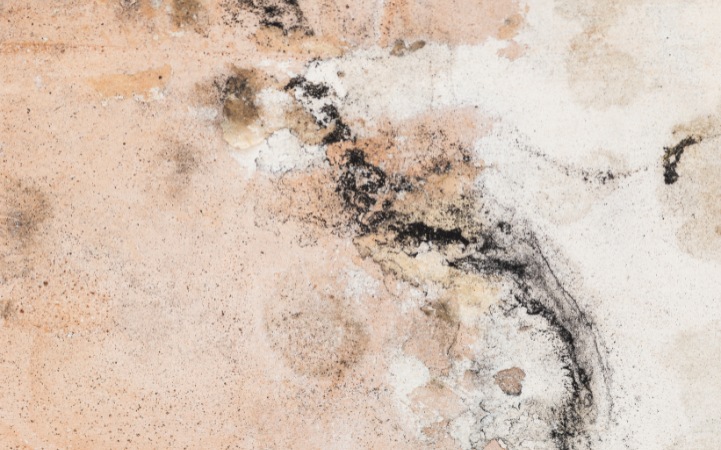
When a mould area is cleaned, it will release mould spores. And dealing with this can be hazardous to your health. Breathing in dangerous spores that have suddenly been released into the air can cause lung problems and even touching them with your bare skin can be dangerous.
As a professional cleaning company, our team of cleaners is equipped with appropriate protective equipment such as high-grade face masks and gloves that allow us to deal with the affected area without causing health problems. We will be able to advise whether it is safe for you to be home while we treat black mould or if the toxic mould could be hazardous for you while we work.
It can be surprising just how physically demanding it can be to clean mould. Powerful mould remover foam spray plus a lot of elbow grease is usually needed and climbing up and down ladders is almost always necessary to be able to reach all of the mould.
Our team of cleaners has the necessary equipment and training to be able to remove mould safely, even in the hardest-to-reach areas.
Removing mould is more than just using some mould removal sprays and calling it a day. Removal of all the mould requires an in-depth knowledge of how mould is caused and different removal techniques so that it can be removed properly and safely, and prevented from occurring again.
We use a variety of techniques to tackle mould issues. First, we will ensure that the surface is properly dried so that the mould will stop growing. Then, we will use an effective fungicide mould spray to kill the black mould and spores.
Next, our job is to figure out how to prevent the mould from reoccurring. We will provide you with effective tips for reducing mould (see next section) but we will also apply mould-prevention paint. This paint creates a thermal barrier that is effective at reducing condensation.
Condensation is most likely to occur when warm moisture in the air hits a cold surface. This is most common on internal walls because of the cold air outside. Anti-mould paint prevents the internal surface of the wall from getting too cold so that condensation is less likely to occur.
Finally, we will assess any structural issues that could be creating moisture such as leaking pipes or cracked walls, and will advise you on how these should be remedied.


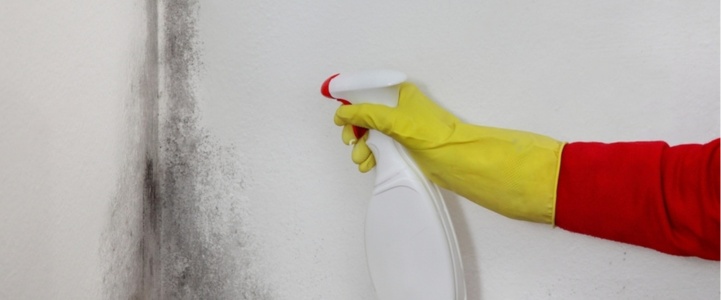
While some mould can be caused by structural issues such as penetrating dampness, there are often things that you can do to help reduce condensation and prevent damp problems and mould from occurring.
Air circulation is key to preventing dampness and mould because mould thrives in moist air and air circulation is effective when trying to reduce moisture. So most tips for preventing mould growth are aimed at letting air circulate as much as possible.
Opening windows is an easy way of providing adequate ventilation. This is especially important in rooms where there is likely to be a lot of moisture in the air, such as bathrooms and in kitchens when food is being cooked/the kettle is boiling due to the hot steam. Making sure that the windows are open at least while you are showing or cooking can help to prevent moisture from settling in.
Ensuring that your extractor fan is clean and working properly can also help air to circulate in your bathroom or kitchen.
Opening the windows in the moisture-prone rooms isn't enough on its own if the internal doors are left open. This is because moisture can travel throughout the house if the doors are open. So make sure that the doors are closed when you're showering in the bathroom or cooking in the kitchen.
This is a difficult piece of advice for many people to follow but if you want to prevent black mould, it is never a good idea to dry your clothes inside on a clothes horse or dryer.
If you don't have a tumble dryer, are trying to save energy, or have clothes that can't be tumble-dried so you need to use a clothes horse, then you can still try to reduce condensation. Again, this is all about allowing the air to circulate. Put the clothes horse in a room with the windows open and the doors shut to try and help as much of the moisture from the clothes to leave the house.
A dehumidifier can be a great solution for reducing the moisture in the air and can be a good investment if you have frequent condensation or mould problems.
We are an experienced cleaning company who know exactly how to remove mould and prevent it from reoccurring. When our team of experienced cleaners arrives, they will assess what is likely to be causing the mould so that they can get to the route of the issue.
Using effective black mould killing techniques, such as a mould remover foam spray, and anti-condensation paint if needed, your home will be free from ould now and in the future. Our expert advice for how you can prevent mould is tailored to you and your home based on a thorough understanding of what is causing mould in your specific situation.
We are professional, experienced, and knowledgeable and we use the latest mould removal and prevention techniques to provide the very best results, every time. Just get in touch today and our friendly team in Consett will help to get the process started so that you can live a life without mould.
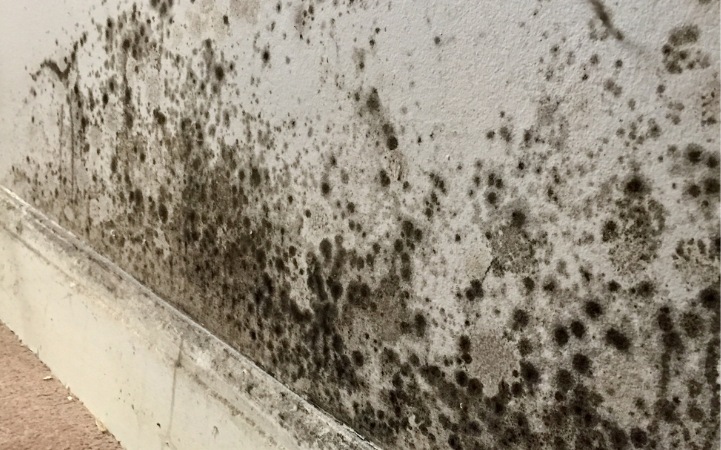
You might have a mould problem if you notice a musty smell, see visible mould growth which might appear as specks of black, green, or white on surfaces, or if you or your family members are experiencing allergic reactions like sneezing, runny nose, and red eyes. Additionally, signs of dampness like water stains, discoloration on walls, floors, or ceilings could also indicate potential mould growth.
Mould thrives in damp and humid conditions. It is often caused by factors like leaks in pipes, roofs or windows, flooding, condensation, poor ventilation, or damp basements or crawl spaces. Organic materials found in homes such as drywall, wood, and fabrics serve as food sources for mould.
Exposure to mould can lead to various health problems. These can range from mild allergic reactions, like sneezing, skin rash, and runny nose, to more severe respiratory problems. Prolonged exposure can lead to chronic conditions such as asthma. Certain types of mould, like black mould, can produce toxins that pose serious health risks.
Yes, professional mould removal services often conduct air tests for mould spores after the removal process. This involves collecting samples from the air and from surfaces in your home, which are then sent to a lab for analysis. This test is essential to ensure that the mould removal was successful and that your home is safe.
